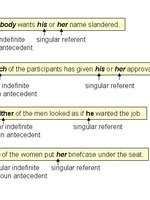
- 06.09.2018
- vlad.pruha.web
- 1
Definition: Ante (not anti) means before. The root cedere means to go. The antecedent goes before the pronoun. It is the noun that the pronoun replaces. A pronoun must match, or agree, with its antecedent in number, person, and gender.
- Hint:
- You can be sure a noun is the antecedent if you can use that noun in place of the pronoun.
My mother gave me her bracelet.
My mother gave me my mother's bracelet.
Number Agreement
Singular nouns must match with singular pronouns. Plural nouns must match with plural pronouns.
Lisa didn't come to school because she was sick. (singular noun, singular pronoun)
After Sasha and Aaron climbed the Great Wall of China, they were totally exhausted. (two nouns, plural pronoun)
The two dogs disappeared as they raced over the hill. (plural noun, plural pronoun)
If two nouns are joined with the conjunction and, use a plural pronoun. If they are joined by or or nor, use a singular pronoun.
John and Randy brought their books to class.
John or Randy brought his book to class.
Neither John nor Randy brought his book to class.
Person Agreement
When writing about yourself, use I, me, we, or us. When writing directly to someone, use you. When writing about someone (or something) else, use he, she, it, him, her, they, or them. Use it when you don't know the gender of the thing you're talking about.
My name is Kitty and I am an English teacher.
The pronoun I replaces the noun Kitty. You would not say My name is Kitty and Kitty is an English teacher.
Carmen felt nervous when Melvin asked her to dance.
The little fish knew it was doomed when the shark came around the corner.
I'm going to the movies with Joey and Michael. Do you know them?
Keep in mind that when using the pronouns I, me, we, us, and you, it's not always necessary to have an antecedent.
Are you going to the dance on Saturday?
When we ask someone a question, we already know who "you" is, so it's not necessary to say the person's name beforehand.
Our parents always threw wonderful birthday parties for us.
Can you give me a ride, please?
Gender Agreement
When writing about men, use he, him, and his. When writing about women, use she and her. If you don't know the gender, use he or she, him or his, or his or her. Only use they and their if the antecedent is plural.
The blind man was about to walk into the street, but I ran over and helped him.
The woman arrived at the store, but she had forgotten her wallet and had to go back home.
- Hint:
- Using their instead of his or her is becoming acceptable in spoken English, but make sure to use his or her in written English. If using his or her sounds awkward, an easy way to fix this problem is to make the subject plural.
Error Corrections A new doctor must pass theircertification exam before getting a license.A new doctor must pass his or her certification exam before getting a license.
We don't know the gender of the doctor.
New doctors must pass their certification exams before getting licenses.
Notice how you also have to make the words exam and license plural in this sentence. That's because each doctor takes his or her own exam and receives his or her own license.
Reviews 1
- 27.02.2023 20:13Hello Dear,
How are you? I hope all is well,My name is elisabeth andrew,i saw your profile at(www.engvid.com) became interested in you for a friendship, I would like to know more about you.
Please contact me through my private email elisabethandrew@aol.com so i can give you my pictures for you to know who i am. I believe we can move from here, it will be a pleasure to know you sincerely!
Please I am waiting for your response!
